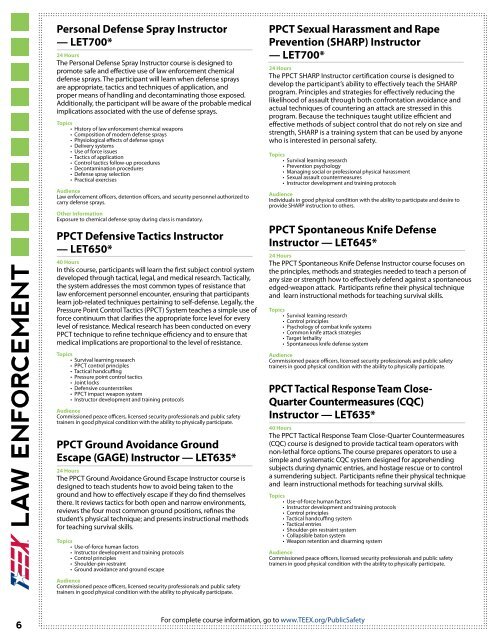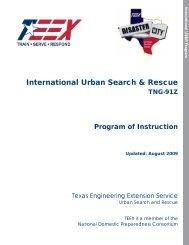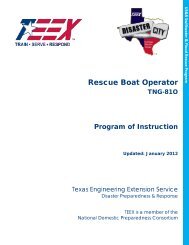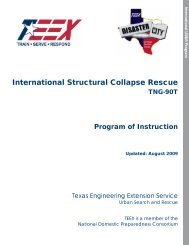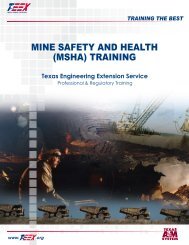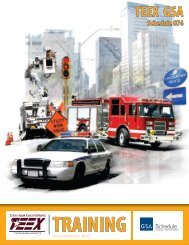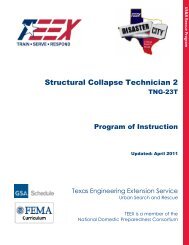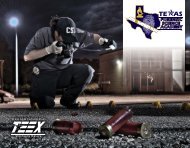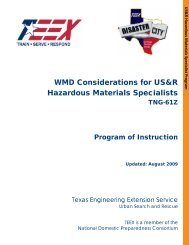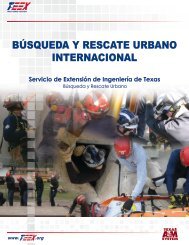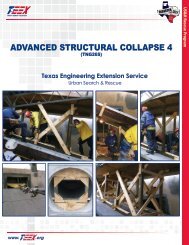PUBLIC SAFETY & SECURITY - Texas Engineering Extension Service
PUBLIC SAFETY & SECURITY - Texas Engineering Extension Service
PUBLIC SAFETY & SECURITY - Texas Engineering Extension Service
You also want an ePaper? Increase the reach of your titles
YUMPU automatically turns print PDFs into web optimized ePapers that Google loves.
Law Enforcement<br />
Personal Defense Spray Instructor<br />
— LET700*<br />
24 Hours<br />
The Personal Defense Spray Instructor course is designed to<br />
promote safe and effective use of law enforcement chemical<br />
defense sprays. The participant will learn when defense sprays<br />
are appropriate, tactics and techniques of application, and<br />
proper means of handling and decontaminating those exposed.<br />
Additionally, the participant will be aware of the probable medical<br />
implications associated with the use of defense sprays.<br />
Topics<br />
• History of law enforcement chemical weapons<br />
• Composition of modern defense sprays<br />
• Physiological effects of defense sprays<br />
• Delivery systems<br />
• Use of force issues<br />
• Tactics of application<br />
• Control tactics follow-up procedures<br />
• Decontamination procedures<br />
• Defense spray selection<br />
• Practical exercises<br />
Audience<br />
Law enforcement officers, detention officers, and security personnel authorized to<br />
carry defense sprays.<br />
Other Information<br />
Exposure to chemical defense spray during class is mandatory.<br />
PPCT Defensive Tactics Instructor<br />
— LET650*<br />
40 Hours<br />
In this course, participants will learn the first subject control system<br />
developed through tactical, legal, and medical research. Tactically,<br />
the system addresses the most common types of resistance that<br />
law enforcement personnel encounter, ensuring that participants<br />
learn job-related techniques pertaining to self-defense. Legally, the<br />
Pressure Point Control Tactics (PPCT) System teaches a simple use of<br />
force continuum that clarifies the appropriate force level for every<br />
level of resistance. Medical research has been conducted on every<br />
PPCT technique to refine technique efficiency and to ensure that<br />
medical implications are proportional to the level of resistance.<br />
Topics<br />
• Survival learning research<br />
• PPCT control principles<br />
• Tactical handcuffing<br />
• Pressure point control tactics<br />
• Joint locks<br />
• Defensive counterstrikes<br />
• PPCT impact weapon system<br />
• Instructor development and training protocols<br />
Audience<br />
Commissioned peace officers, licensed security professionals and public safety<br />
trainers in good physical condition with the ability to physically participate.<br />
PPCT Ground Avoidance Ground<br />
Escape (GAGE) Instructor — LET635*<br />
24 Hours<br />
The PPCT Ground Avoidance Ground Escape Instructor course is<br />
designed to teach students how to avoid being taken to the<br />
ground and how to effectively escape if they do find themselves<br />
there. It reviews tactics for both open and narrow environments,<br />
reviews the four most common ground positions, refines the<br />
student’s physical technique; and presents instructional methods<br />
for teaching survival skills.<br />
Topics<br />
• Use-of-force human factors<br />
• Instructor development and training protocols<br />
• Control principles<br />
• Shoulder-pin restraint<br />
• Ground avoidance and ground escape<br />
Audience<br />
Commissioned peace officers, licensed security professionals and public safety<br />
trainers in good physical condition with the ability to physically participate.<br />
PPCT Sexual Harassment and Rape<br />
Prevention (SHARP) Instructor<br />
— LET700*<br />
24 Hours<br />
The PPCT SHARP Instructor certification course is designed to<br />
develop the participant’s ability to effectively teach the SHARP<br />
program. Principles and strategies for effectively reducing the<br />
likelihood of assault through both confrontation avoidance and<br />
actual techniques of countering an attack are stressed in this<br />
program. Because the techniques taught utilize efficient and<br />
effective methods of subject control that do not rely on size and<br />
strength, SHARP is a training system that can be used by anyone<br />
who is interested in personal safety.<br />
Topics<br />
• Survival learning research<br />
• Prevention psychology<br />
• Managing social or professional physical harassment<br />
• Sexual assault countermeasures<br />
• Instructor development and training protocols<br />
Audience<br />
Individuals in good physical condition with the ability to participate and desire to<br />
provide SHARP instruction to others.<br />
PPCT Spontaneous Knife Defense<br />
Instructor — LET645*<br />
24 Hours<br />
The PPCT Spontaneous Knife Defense Instructor course focuses on<br />
the principles, methods and strategies needed to teach a person of<br />
any size or strength how to effectively defend against a spontaneous<br />
edged-weapon attack. Participants refine their physical technique<br />
and learn instructional methods for teaching survival skills.<br />
Topics<br />
• Survival learning research<br />
• Control principles<br />
• Psychology of combat knife systems<br />
• Common knife attack strategies<br />
• Target lethality<br />
• Spontaneous knife defense system<br />
Audience<br />
Commissioned peace officers, licensed security professionals and public safety<br />
trainers in good physical condition with the ability to physically participate.<br />
PPCT Tactical Response Team Close-<br />
Quarter Countermeasures (CQC)<br />
Instructor — LET635*<br />
40 Hours<br />
The PPCT Tactical Response Team Close-Quarter Countermeasures<br />
(CQC) course is designed to provide tactical team operators with<br />
non-lethal force options. The course prepares operators to use a<br />
simple and systematic CQC system designed for apprehending<br />
subjects during dynamic entries, and hostage rescue or to control<br />
a surrendering subject. Participants refine their physical technique<br />
and learn instructional methods for teaching survival skills.<br />
Topics<br />
• Use-of-force human factors<br />
• Instructor development and training protocols<br />
• Control principles<br />
• Tactical handcuffing system<br />
• Tactical entries<br />
• Shoulder-pin restraint system<br />
• Collapsible baton system<br />
• Weapon retention and disarming system<br />
Audience<br />
Commissioned peace officers, licensed security professionals and public safety<br />
trainers in good physical condition with the ability to physically participate.<br />
6<br />
For complete course information, go to www.TEEX.org/PublicSafety


